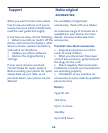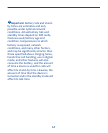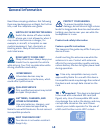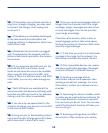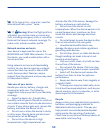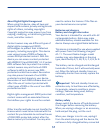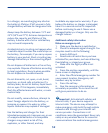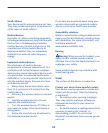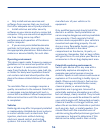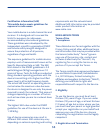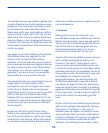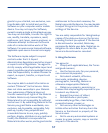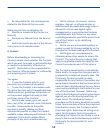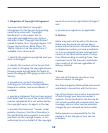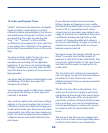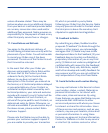
• Only install and use services and
software from sources that you trust and
that offer adequate security and protection.
• Install antivirus and other security
software on your device and any connected
computer. Only use one antivirus application
at a time. Using more may affect
performance and operation of the device
and/or computer.
• If you access preinstalled bookmarks
and links to third party internet sites, take
the appropriate precautions. Nokia does not
endorse or assume liability for such sites.
Operating environment
This device meets radio frequency exposure
guidelines in the normal use position at the
ear or at least 1.5 centimetres (5/8 inch)
away from the body. Any carry case, belt clip,
or holder for body-worn operation should
not contain metal and should position the
device the above-stated distance from your
body.
To send data files or messages requires a
quality connection to the network. Data files
or messages may be delayed until such a
connection is available. Follow the separation
distance instructions until the transmission
is completed.
Vehicles
Radio signals may affect improperly installed
or inadequately shielded electronic systems
in motor vehicles such as electronic fuel
injection, electronic antilock braking,
electronic speed control, and air bag
systems. For more info, check with the
manufacturer of your vehicle or its
equipment.
Only qualified personnel should install the
device in a vehicle. Faulty installation or
service may be dangerous and may invalidate
your warranty. Check regularly that all
wireless device equipment in your vehicle is
mounted and operating properly. Do not
store or carry flammable liquids, gases, or
explosive materials in the same
compartment as the device, its parts, or
accessories. Remember that air bags inflate
with great force. Do not place your device or
accessories in the air bag deployment area.
Potentially explosive environments
Switch your device off in any area with a
potentially explosive atmosphere, for
example near petrol pumps at service
stations. Sparks in such areas could cause an
explosion or fire resulting in bodily injury or
death. Observe restrictions in fuel service
stations, storage, and distribution areas;
chemical plants; or where blasting
operations are in progress. Areas with a
potentially explosive atmosphere are often,
but not always, clearly marked. They include
areas where you would be advised to switch
your vehicle engine off, below deck on boats,
chemical transfer or storage facilities, and
where the air contains chemicals or particles
such as grain, dust, or metal powders. You
should check with the manufacturers of
vehicles using liquefied petroleum gas (such
as propane or butane) to determine if this
device can be safely used in their vicinity.
54



